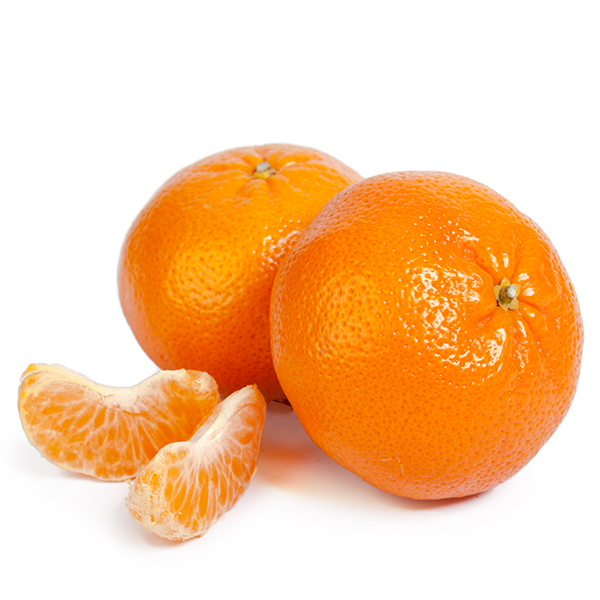MANDARIN
_
The mandarin is a fruit similar to the orange but smaller and flattened in its base. It’s shining orange-colored and very easy to peel, even with the hands. The mandarin is consumed mainly as fresh fruit, although there are also tinned mandarin gores.
Category: Fruits
Nutritional Values/100g
47
Kcal
Kcal
13.34 g
Carbohydrates
Carbohydrates
10.58 g
Sugar
Sugar
2 mg
Sodium
Sodium
1.8 g
Fiber
Fiber
0.31 g
Fat
Fat
0.81 g
Protein
Protein
Benefits
Benefits
In addition to the extraordinary sweet taste, mandarins contain vitamins, minerals, and antioxidants that are essential for the health of the body. There are many common properties between citrus fruits. Here are some of the benefits of eating mandarin:
Resistant to the disease: Beta-carotene and beta-cryptoxanthin are compounds that in citrus fruits, including mandarin, cause dark orange. These compounds in mandarin are greater than in Oranges and can reduce the risk of some cancers. These compounds in the body also become vitamin A, which helps in the health of the eye and vision and the body’s growth. Mandarin contains a lot of vitamin C that improves the strength and readiness of the immune system and helps to improve skin health and wounds.
Regulates the level of cholesterol in the body: This small sweet fruit, with soluble fiber, reduces the absorption of bad cholesterol (LDL) and helps to prevent cardiovascular health and prevent heart attacks caused by bad cholesterol. Also, soluble fibers in your diet will make you feel full for longer.
Help control blood pressure: Eating fatty foods, alcoholic beverages, and smoking are things that raise blood pressure. Soluble fibers in fruits and vegetables, including mandarin, reduce blood pressure. Mandarin also helps reduce pressure in the blood vessel wall and reduces blood pressure with potassium which reduces sodium (salt) in the body.
Makes the bones stronger: This high-quality fruit, in addition to potassium, also contains calcium and magnesium, and people who have and maintain these three minerals in their body have better density bones. This means stronger bones with less likely fracture.
But you should be careful about consuming mandarin: Even excessive in healthy and good foods will make you trouble. Consuming a lot of mandarins brings a lot of sugar to your body and causes obesity and complications. So be careful about the amount of consumption. Pregnant women who are prone to allergies should avoid overconsumption of mandarin during pregnancy. Because one of the characteristics of mandarin is the sensitivity of some people which causes itching and nose water. This allergy may also spread to the fetus and cause diseases such as asthma, eczema, and dermatitis in the baby. The acid in mandarin causes more acidification of the stomach and exacerbates gastric reflux disease (GERD). Excessive consumption of mandarin can also cause kidney stones and gallstones, as it prevents calcium absorption in the body. If you have severe symptoms of diarrhea, vomiting, abdomen, and stomach ache, contact the emergency department.
Resistant to the disease: Beta-carotene and beta-cryptoxanthin are compounds that in citrus fruits, including mandarin, cause dark orange. These compounds in mandarin are greater than in Oranges and can reduce the risk of some cancers. These compounds in the body also become vitamin A, which helps in the health of the eye and vision and the body’s growth. Mandarin contains a lot of vitamin C that improves the strength and readiness of the immune system and helps to improve skin health and wounds.
Regulates the level of cholesterol in the body: This small sweet fruit, with soluble fiber, reduces the absorption of bad cholesterol (LDL) and helps to prevent cardiovascular health and prevent heart attacks caused by bad cholesterol. Also, soluble fibers in your diet will make you feel full for longer.
Help control blood pressure: Eating fatty foods, alcoholic beverages, and smoking are things that raise blood pressure. Soluble fibers in fruits and vegetables, including mandarin, reduce blood pressure. Mandarin also helps reduce pressure in the blood vessel wall and reduces blood pressure with potassium which reduces sodium (salt) in the body.
Makes the bones stronger: This high-quality fruit, in addition to potassium, also contains calcium and magnesium, and people who have and maintain these three minerals in their body have better density bones. This means stronger bones with less likely fracture.
But you should be careful about consuming mandarin: Even excessive in healthy and good foods will make you trouble. Consuming a lot of mandarins brings a lot of sugar to your body and causes obesity and complications. So be careful about the amount of consumption. Pregnant women who are prone to allergies should avoid overconsumption of mandarin during pregnancy. Because one of the characteristics of mandarin is the sensitivity of some people which causes itching and nose water. This allergy may also spread to the fetus and cause diseases such as asthma, eczema, and dermatitis in the baby. The acid in mandarin causes more acidification of the stomach and exacerbates gastric reflux disease (GERD). Excessive consumption of mandarin can also cause kidney stones and gallstones, as it prevents calcium absorption in the body. If you have severe symptoms of diarrhea, vomiting, abdomen, and stomach ache, contact the emergency department.

